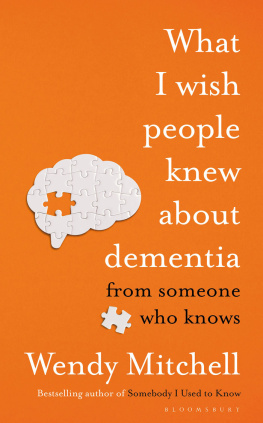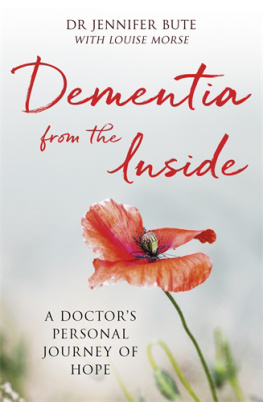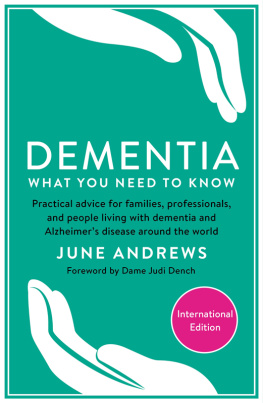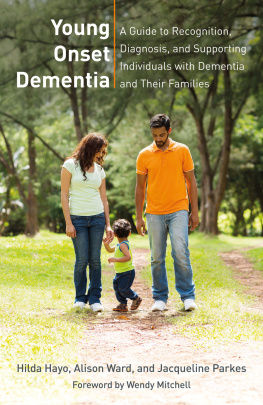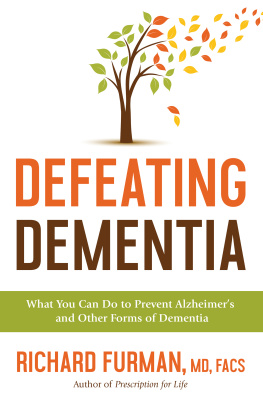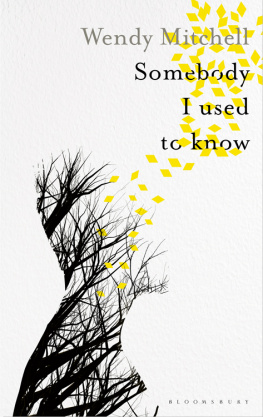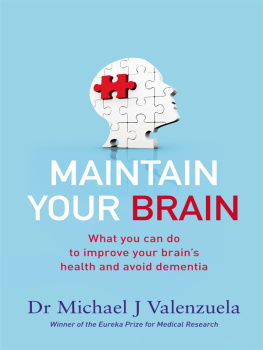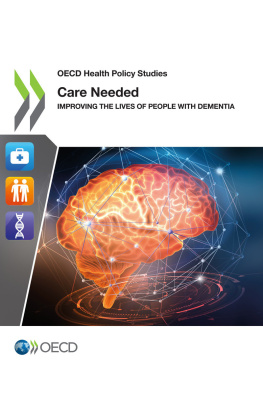
What I Wish
People Knew
About Dementia
BY THE SAME AUTHORS
Somebody I Used to Know

BLOOMSBURY PUBLISHING
Bloomsbury Publishing Plc
50 Bedford Square, London, WC1B 3DP, UK
29 Earlsfort Terrace, Dublin 2, Ireland
BLOOMSBURY, BLOOMSBURY PUBLISHING and the Diana logo are trademarks of Bloomsbury Publishing Plc
First published in Great Britain 2022
Copyright Wendy Mitchell and Anna Wharton, 2022
Wendy Mitchell and Anna Wharton have asserted their right under the Copyright, Designs and Patents Act, 1988, to be identified as Authors of this work
For legal purposes the constitute an extension of this copyright page
All rights reserved. No part of this publication may be reproduced or transmitted in any form or by any means, electronic or mechanical, including photocopying, recording, or any information storage or retrieval system, without prior permission in writing from the publishers
Bloomsbury Publishing Plc does not have any control over, or responsibility for, any third-party websites referred to in this book. All internet addresses given in this book were correct at the time of going to press. The author and publisher regret any inconvenience caused if addresses have changed or sites have ceased to exist, but can accept no responsibility for any such changes
A catalogue record for this book is available from the British Library
ISBN: HB: 978-1-5266-3448-1; TPB: 978-1-5266-4688-0;
EBOOK: 978-1-5266-3449-8; EPDF: 978-1-5266-4712-2
Typeset by Newgen KnowledgeWorks Pvt. Ltd., Chennai, India
To find out more about our authors and books visit www.bloomsbury.com and sign up for our newsletters
Dedicated to my wonderful friend Sylvia, sadly no longer here but never forgotten
Contents
Here we are again. It is March 2021, and I am writing a second book after what has been a difficult year for all of us. I decided to write a follow-up to my bestselling memoir, Somebody I Used to Know , in the summer of 2020. The plan was for it to be published in 2022, and the first thing I said to my partner-in-writing, Anna Wharton, when I realised this was: I dont plan to be around then.
Anna gently reminded me that Id said this on publication of my first book in 2018, and yet here I still am.
As I write this, it has been almost seven years since my diagnosis of young-onset dementia and I still live alone, independently, without carers. What have I learned since that day in July 2014, when I sat in front of the neurologist and heard confirmation of those words that had been whispered to me in various letters and examinations in the lead-up to that date? Like many people, I knew nothing about dementia at the point of my diagnosis. All I did know were the snippets that we pick up, through the media, newspapers, television, perhaps a second-hand tale from a friend. I was frightened, of course, like most people. I was terrified of this progressive illness and its planned trajectory that would, slowly but surely, be revealed to me. I suddenly felt I had lost control of my own life, which is a very scary feeling and also a very normal one.
So back to my question: what have I learned? Well, firstly, that I actually had much less to be afraid of than I thought. That yes, dementia is a bummer of a diagnosis but, like everything in life, it has a beginning, a middle and an end. Who knows where I am on my journey with this disease? What I see now, from this vantage point, is just a slice of the final sum total of my story with dementia. Is that really that dissimilar to how any of us live our lives? After all, the only certainty I have is the same as what everyone else has, which is actually just today.
But the reason I wanted to write this book is because I wanted to share with you just some of what I have learned about dementia because I think it might surprise you, it might inspire you, it will definitely inform you, and, with any luck, it will help you to live the best life you are able to with the disease or support someone you know far better.
What has made the biggest difference to me are the people who I have met along the way. To be able to talk and share experiences with friends I have made who also live with dementia has made me feel more normal on days when the world seems a little fuzzy. To know that there are other people out there, struggling one day, thriving the next, but living all the same not suffering (I hate that word) but living makes a huge difference. And because theyve made such a big difference to me, I wanted you to hear from them too, because my experience of dementia is only my experience. When youve met one person with dementia, youve simply met one person with dementia. Were as different as we all were before dementia. So it was important for me that this time round, you heard from others. Although you wont always read their names in the book, the voices that will share their experiences belong to the following people: Elaine, Eric, Eddy, Pat, Monica, Sue, Roland, Bob, Sue, Barbara, Colin, Brian, Janet, Paul, Delyse, Stewart, Gail, George, Dory and Agnes. All of these people are living with dementia in their fifties, sixties, seventies and eighties, or are care partners of people with dementia. Some have been diagnosed longer than me; some were diagnosed in the last couple of years.
When I was diagnosed, I had no idea where to start gathering information about what this new disease might look like for me. When youre diagnosed, youre suddenly meant to find out all this for yourself: no one contacts you to point you in the direction of support services or peer groups. You might not even be ready to attend any, maybe for months afterwards. But where, then, do you start? So often I hear: Well, we put out leaflets and posters. But how do you know where to look for them, or what to look for?
I hope this book will at least give people a start. Imagine me while you are reading, gently taking you by the shoulders and steering you in the direction of some information I think you might find useful. I dont proclaim that this is an exhaustive list of answers to your questions, but its a good place to begin.
When people think of dementia, they immediately associate it with memory. Few people realise, for example, just how it changes our relationships with our senses, our emotions, our communication. Few people understand the importance of a good environment both inside and out after a dementia diagnosis, and the small changes that can make a big difference. Unless you tell them, or talk about it, people will never know the difference dementia makes to your relationships and how to make them work better. And if you dont know any of this at all, how can you be responsible for your attitude?
I hope I address all of these areas for you, whether you are someone living with dementia, someone supporting a person with the disease, a professional working in the field, or just a curious individual who believes that empathy and inclusivity is better for all of us to you I extend an especially warm welcome. In these pages youll find all the things that I wish people knew about dementia.
Wendy Mitchell
November 2021
Like tiny bubbles rising to the surface in a pan of boiling water, memories can still surprise even those of us who have a disease that steals them. I thought of one the other day, of exactly that: my first home economics class, boiling a pan of water ready to receive an egg.
I had carried that egg to school tenderly, nestled inside a ball of wool. When I arrived at school, Mrs Marple, the home economics teacher, chastised me: Eggs belong in egg boxes, she said.
Next page
